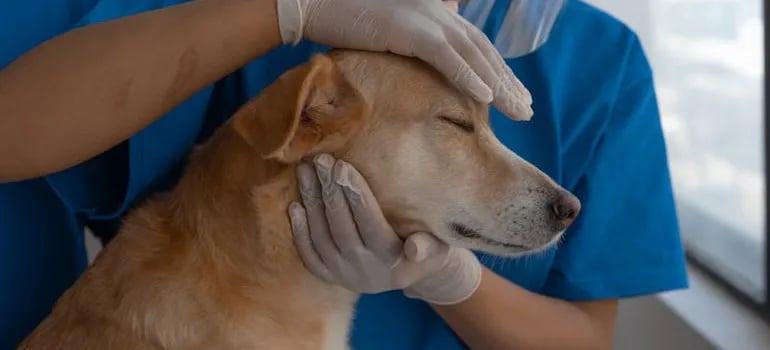Guaranteed Comfort and Complete Care for Your Pet.

Stress Colitis in Dogs: Signs, Treatment, and Prevention


Stress colitis in dogs can cause sudden diarrhea, discomfort, and dehydration. Puppies are especially sensitive and need quick care. This condition often appears after anxiety, a change in routine, or loud noises. You might notice mucus in the stool or frequent urgent trips outside. Stress colitis in puppies may look more severe because of their smaller size and weaker immune system. Finding the right colitis in puppies cure means focusing on hydration, bland food, and removing any stress triggers quickly. Some common colitis puppy symptoms include soft stool, mucus, and sudden urgency after stress or a change in routine.
Because of this, stress diarrhea in puppies can become serious quickly and often needs faster care than in adult dogs. Some owners search for answers using terms like colitis in puppies, especially when dealing with very young dogs. Common colitis in puppies symptoms include runny stools, mucus, and frequent urgency.
Thankfully, early signs are treatable. With the right dog stress colitis treatment, recovery happens fast. If you’re searching for a trusted dog stress colitis remedy, start with bland meals, hydration, and limiting emotional triggers. If symptoms don’t improve, contact a pet health veterinary clinic. They can guide you through proper care and long-term prevention. Keep reading to understand signs, treatments, and simple ways to avoid future flare-ups.
What is stress colitis in dogs?
So, what is colitis in dogs? Many pet owners ask, Can stress cause colitis in dogs, or is it always tied to food or infection? The answer is yes. Stress colitis in dogs, and especially anxious dogs, is a common pet disease that causes inflammation in the colon. Stress related colitis in dogs often shows up after sudden changes or emotional triggers that upset the digestive system. Another common question is, can dogs get diarrhea from stress alone, without any underlying illness? The answer is still yes. The answer is yes—stress directly affects digestion and bowel habits. It usually follows a stressful event or routine change. Stress diarrhea in dogs may contain mucus or blood and often leads to frequent, urgent bowel movements.
Very stressful situations can be a cause of stomach problems!
In Dubai, extreme heat, loud construction noise, and shifts in daily schedules can trigger these symptoms. A puppy left alone too long or exposed to heat may develop gut trouble. These cases often clear up with care. For mild flare-ups, a calm space and simple meals are usually enough as part of basic nervous colitis treatment. Many ask how to treat colitis in dogs naturally—bland food, probiotics, and calm help. But is stress colitis in dogs deadly? Not usually, though untreated cases can lead to dehydration or worse. Always act early if canine stress colitis symptoms persist.
How do dogs get stress diarrhea?
So, can stress cause diarrhea in dogs? Emotional shifts impact digestion faster than many owners expect. Many pet owners wonder, does stress give dogs diarrhea, especially after big changes or loud events—and the answer is yes. Also, a common question pet owners ask is, Can stress cause a dog to have diarrhea without any other illness? The answer is yes, stress alone can upset digestion. Can stress cause dog diarrhea? A common question is, can dogs get stress diarrhea from routine changes or noise? Yes, dogs often show digestive changes after loud events, travel, or time away from their routine.
Stress colitis in dogs starts the same way. It's well known that stress in dogs causes diarrhea, especially during major changes or overstimulating events. Blood flow shifts away from the digestive tract and moves toward muscles. This slows digestion and affects how the colon works. As a result, the colon can become inflamed. The bacterial balance also changes, which causes stress-induced diarrhea in dogs. Dogs may pass mucus or blood in loose stools. The colon usually absorbs water and nutrients. When inflamed, it fails to do that. More fluid stays in the stool, leading to diarrhea.


New surroundings, routine changes, stressful loud events or traveling can all cause these issues.
Dogs can lose important nutrients during this process. Dog stress diarrhea treatment often starts with rest, hydration, and bland food. Many also ask how to treat stress diarrhea in dogs, especially when symptoms appear suddenly after loud noises or big changes. A calm environment, simple meals, and probiotics often help recovery. Stress colitis in dogs is a common pet disease. The link between stress and colitis is clear, but early care helps manage it well.
What causes stress colitis?
Many daily situations fall under what causes stress in dogs, especially when changes affect routine or environment. Dog stress induced colitis often starts after changes in environment, loud events, or emotional upsets like separation or travel. It’s common to see dog diarrhea from stress in pets exposed to change, noise, or travel. These events often lead to nervous colitis in dogs, where stress directly impacts gut function and may cause dog anxiety diarrhea. Diarrhea in dogs from stress often comes on fast and may include mucus, urgency, and frequent bowel movements.
Many cases of anxiety diarrhea in dogs are triggered by a sudden change or overexcitement. High heat, noise, and busy routines in Dubai add extra pressure, often leading to dog diarrhea stress in sensitive pets. You might also notice dog stress poop that’s loose, urgent, and filled with mucus. Here are some common triggers that often lead to stress diarrhea, and other dog colitis causes include:
Staying in a kennel or daycare
Long car rides or air travel
Being confined after surgery or illness
Sudden schedule changes
Moving to a new home or city
A new baby, pet, or loud guests
Fireworks, construction, or thunderstorms
Pain from illness or injury
Overstimulation during exciting activities
Colitis in dogs Dubai cases often spike in summer due to heat stress and travel. Puppies and seniors are more affected due to weaker immune responses. Some breeds that struggle with anxiety may show symptoms of colitis more often than others.
When to see a vet
You should seek emergency help if your dog shows serious symptoms that go beyond stress colitis. Watch closely for colitis in dogs signs like loose stools, blood, mucus, or frequent urgency. Colitis symptoms in dogs commonly include mucus in the stool, urgency, and frequent bowel movements. More serious symptoms of stress colitis in dogs include diarrhea lasting over 24 hours, vomiting, shaking, or loss of appetite. Lethargy or blood in the stool also signals trouble. These signs could mean dog colitis is getting worse. Recognizing early signs of stress in a dog can help prevent gut issues from escalating. Recognizing early signs of stress colitis in dogs can help you act faster.


The best time to see a vet is as soon as you notice these signs!
While colitis in dogs treatment often starts at home, some cases need urgent medical attention. Puppies, seniors, or dogs with other health issues can go downhill fast. Don’t wait too long. If your dog looks weak, confused, or dehydrated, that’s the time to take your dog to the vet. Early care prevents complications and speeds up recovery for colitis dogs. Trust your gut and make sure you find out what causes stress colitis in dogs. Many owners ask: Can dogs get colitis from stress? The answer is yes; emotional strain can trigger gut inflammation even without other health issues.
How is stress colitis diagnosed?
If your dog shows signs and symptoms of colitis, your vet may diagnose stress colitis after a physical exam and fecal test. The absence of parasites, along with history and dog colitis symptoms, helps confirm the cause. But if the symptoms of colitis in dogs worsen or don’t improve, your vet may look for other conditions. These may include:
Viral or bacterial infections
Intestinal parasites in dogs
Eating trash or unsafe food
Irritable bowel syndrome (similar to stress colitis in dogs)
Kidney or liver issues
Inflammatory bowel disease
Gastrointestinal cancer
Some chronic issues like inflammatory bowel disease (IBD) in dogs often resemble stress colitis but require different treatment. To rule out these problems, your vet may suggest laboratory tests, X-rays, or an ultrasound. These help confirm the cause and guide treatment. Catching issues early improves outcomes and helps avoid complications.
What is the treatment for stress colitis in dogs?
The right colitis treatment for dogs depends on the trigger, the dog’s age, and how quickly you catch the symptoms. Treating colitis in dogs involves managing both gut inflammation and the emotional stress behind the flare-up. Stress diarrhea in dogs often clears up with the right mix of diet changes, supplements, and stress control. Dog colitis treatment usually depends on the severity of symptoms and the specific triggers behind each case. The treatment of colitis in dogs often includes diet changes, calming strategies, and vet-monitored supplements. Anti-diarrheal medication may help in more severe cases, but calming the dog is just as important. In more serious cases, your vet might recommend canine colitis medication to reduce inflammation and help ease digestive upset.


Loud sounds, travel, or even Dubai’s hot climate can trigger episodes, especially in anxious pets. Common canine colitis symptoms include runny stools, mucus, and frequent trips outside. If you’re searching for how to treat colitis in dogs at home, fiber, probiotics, and simple meals are often helpful. Many pet owners also explore home remedies for stress colitis in dogs, especially during mild flare-ups. For ongoing support and expert guidance on puppy colitis treatment or how to treat stress colitis in dogs, contact Petland Wellness Dubai. We offer full care plans for dog anxiety, diarrhea, and related issues. A solid stress colitis dog treatment plan starts with early detection, steady routines, and the right dietary support.
Proper colitis dogs treatment also depends on the cause and how well your dog responds to food and lifestyle adjustments. Every case is different, so colitis in dog treatment must match the root cause and the pet’s overall condition.
Anti-diarrheal medications
Many effective dog stress diarrhea remedies include fiber (to firm up stool), probiotics (to support gut bacteria), and kaolin (to reduce inflammation). These diarrhea remedies can come in a liquid or tablet form, depending on the product. Or some probiotics come in a fine powdered form.
It is important o only give your dog veterinarian-prescribed anti-diarrhea medications, not over the counter anti-diarrheal medications for humans, unless instructed otherwise by your vet. Using Pepto-Bismol® for dogs could cause black stools and further stomach upset. And while Imodium® is very powerful and can work for some dogs, it should only be given if recommended by your veterinarian.
Fiber supplementation
The vet may recommend increased dietary fiber for dogs with stress colitis. This can be a great natural way to help improve fecal consistency and the movement of foodstuffs and waste through the colon. Fiber is also known to help aid metabolism in bacteria present in the colon.
Avoid flavored or sugar-free versions—only use unflavored Metamucil for dogs, as other types may contain xylitol, which is toxic. However stay away from flavored, sugar-free, or gummy formulations of Metamucil. These products may contain harmful ingredients such as xylitol (i.e. birch sugar), which is toxic for dogs.
Alternatively, you can look for a higher-fiber commercial and prescription dog food.
Bland easily digestible diet
In some cases, the vet may recommend fasting your dog for 12-24 hours and then starting to feed him or her a bland diet for dogs. Or in other situations, the vet may recommend giving your dog a bland, easily digestible diet right away.
There are numerous prescription diets available that are higher in fiber and contain probiotics and prebiotics while also being specifically formulated to be easier to digest than the average commercial diet. These can be a great (and convenient) option. Alternatively, you can make a home-cooked bland diet such as skinless boiled chicken and boiled rice. Many pet owners ask what puppy food is best for stress colitis during flare-ups and after recovery begins.
With either diet option, the vet will most likely have you gradually transition to your dog’s normal food after about three to five days (or sometimes longer, depending on how your dog is doing).
Probiotics
Colonic health is tied to the health of its bacterial population. However, in colitis, the bacterial population may become abnormal. Therefore, your vet may suggest a probiotic supplement to help replenish the ‘good’ bacteria in your dog’s gut. Dog colitis probiotics can help rebuild healthy gut bacteria after flare-ups.
Decreasing your dog’s fear, anxiety, and stress
As mentioned earlier, it is important to control your dog’s stress level as much as possible. Removing the source of stress is ideal, but understandably, it isn’t always possible. Therefore, especially if your dog is prone to stress colitis, your vet may also talk to you about calming medications, supplements, or even anxiety medications (e.g., trazodone for dogs).
Antibiotics
Veterinarians used to prescribe antibiotics such as metronidazole for stress colitis in dogs, but that practice is now less common. But this practice is falling out of favor. Current research indicates antibiotics aren’t as helpful as was once believed, and may even negatively impact the gut bacteria. Plus, antibiotics could worsen diarrhea in some cases.
Treatment for other causes of colitis
If the blood work, fecal tests, or other diagnostics reveal another contributing factor, the vet will address it as well. For example, he or she may prescribe a dewormer, anti-inflammatories, or a hypoallergenic diet for some causes of colitis. Each case is different, so colitis treatment dogs receive should always match the cause and severity.
How long does stress colitis in dogs last?
Wondering how long stress diarrhea lasts in dogs? In most cases, symptoms clear up within three to five days. During that time, you may notice loose stools, mucus, or more frequent bowel movements. Most cases of colitis in dogs resolve within three to five days, especially with early care and rest. Many owners ask, can stress colitis in dogs go away on its own? In mild cases, yes—but early support still matters. Some dogs may also need anti-diarrheal medication. However, if your dog shows no improvement or starts to get worse, contact Petland Wellness Dubai and get the right treatment for your best friend!
Calming your furry friend is just as important as the medication!


While in some cases the symptoms might go away on their own, we strongly suggest taking your pet to the vet as soon as possible!
Ongoing symptoms could point to another condition or a different type of colitis. In some cases, especially in warmer regions, colitis in dogs Dubai cases may last longer due to added heat stress. Always monitor your dog’s progress closely. Early treatment and follow-up help prevent complications and make it easier to manage stress colitis in dogs properly.
Which dogs are mostly affected?
Stress-induced colitis in dogs can affect any breed, but some dogs are more vulnerable than others. Small breeds, high-energy dogs, and those with nervous temperaments often face more frequent flare-ups. Dog breeds prone to colitis include German Shepherds, French Bulldogs, and Border Collies. These dogs may react more strongly to change, noise, or separation. Anxiety colitis in dogs often appears after travel, boarding, or loud events. Colitis in dogs from stress usually responds well to care, but repeated episodes need long-term support. Stress colitis in dogs treatment may involve calming routines, special diets, or vet-prescribed supplements. Knowing which dog breeds are prone to colitis helps owners stay alert and manage symptoms early.
How can you prevent stress colitis in dogs?
If you're wondering how to prevent stress colitis in dogs, the key is to stay proactive and consistent. While symptoms often resolve within days, it’s still important to reduce future flare-ups. Dogs prone to stress colitis can benefit from simple changes in their daily routine. Managing their stress and supporting gut health can go a long way. Always watch for signs early and talk to your vet if you notice a pattern. To lower the chances of a new episode, try these steps:
Ask your vet about calming supplements or anti-anxiety medication before stressful events.
Choose less stimulating alternatives to known stressors (e.g., dog-sitter instead of boarding kennel).
Work with a veterinary behaviorist or qualified trainer to reduce stress triggers.
Use prebiotics and probiotics daily to keep gut bacteria in balance.
Feed a prescription gastrointestinal diet if your vet recommends it long-term.
Keep your dog’s space quiet, relaxed, and free of tension whenever possible.
Prepare for high-stress periods with a plan that includes food, fiber, and medication.
Track each episode of stress colitis and note the surroundings—it may help you uncover hidden triggers.
With these habits, you can manage stress colitis in dogs more effectively and make everyday life easier for both of you. Long-term colitis prevention depends on recognizing stress patterns early and supporting your dog’s gut health every day.
Take some of the stress out of stress colitis.
Stress colitis in puppies and adult dogs can feel overwhelming, but it doesn’t have to stay that way. When you understand what triggers dogs stress colitis and how to respond, you can manage it with more confidence. Tracking dog colitis symptoms early helps prevent flare-ups. So does having a clear plan in place. With the right support, even dog stress diarrhea treatment becomes simpler to handle. Work with your vet to adjust routines, reduce anxiety, and support digestion. And don’t be afraid to ask questions or revisit the plan if things change. If you're in Dubai and need expert care, Petland Wellness Dubai is here to help. Our team can guide you through treatment, support your dog’s recovery, and help prevent future flare-ups, so both you and your dog can feel more at ease.
FAQ
How to stop stress colitis in dogs?
Reduce stress, offer a bland diet, use probiotics, and follow your vet’s treatment plan.
How to tell if a dog has stress colitis?
Look for runny stools, mucus, urgency, and changes after a stressful event.
How is colitis treated in dogs?
With diet changes, stress control, probiotics, and vet-approved medication if needed.
What can I feed my dog with stress colitis?
Feed boiled chicken, white rice, or prescription gastrointestinal diets.
What not to feed dogs with colitis?
Avoid fatty food, dairy, table scraps, and anything spicy or heavily processed.
Can my dog get diarrhea from stress?
Yes, stress often triggers diarrhea in sensitive dogs.

